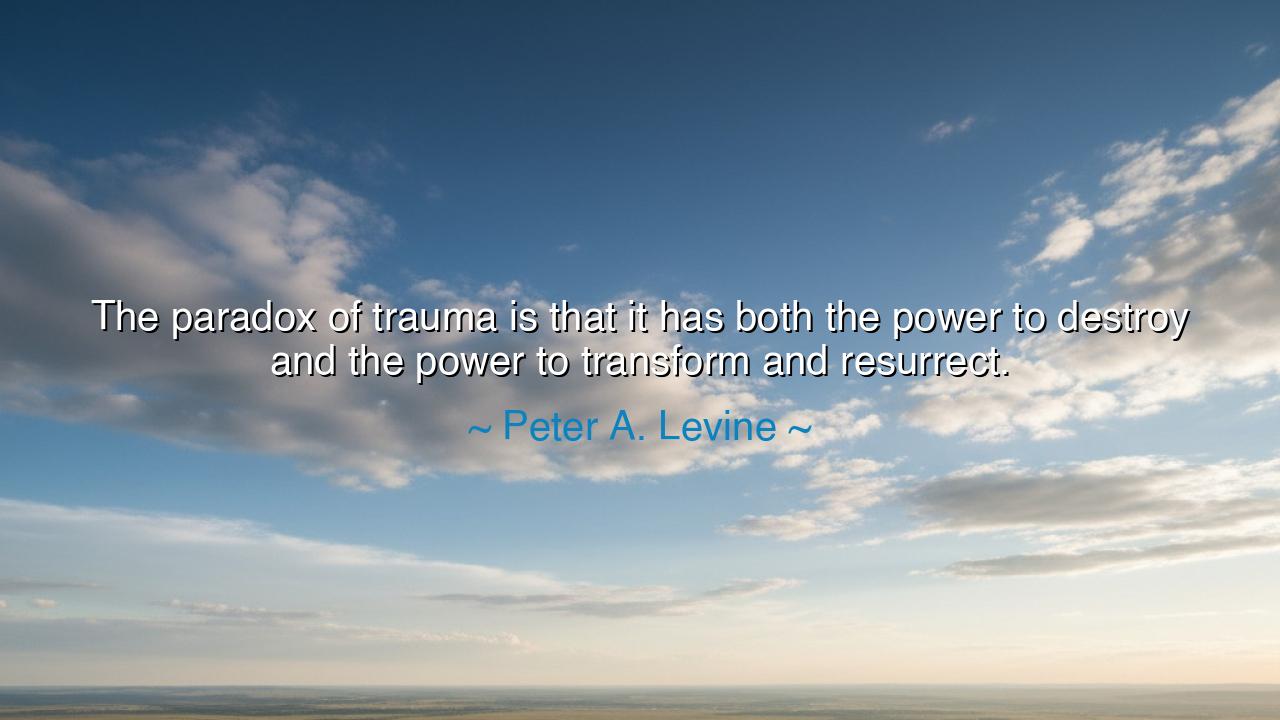
The paradox of trauma is that it has both the power to destroy
The paradox of trauma is that it has both the power to destroy and the power to transform and resurrect.






“The paradox of trauma is that it has both the power to destroy and the power to transform and resurrect.” These profound words from Peter A. Levine touch upon the dual nature of trauma—its ability to wound and its potential to heal, if we are willing to face it. Levine recognizes that trauma is not a force easily understood, for it holds the power to shatter lives, yet also the power to rebuild them, stronger and more resilient than before. In this paradox lies the profound truth that trauma, though painful, is not merely a force of destruction. When navigated with care, it can lead to transformation and profound growth.
The ancients knew this well. Homer's Iliad recounts the tragic story of Achilles, whose rage and sorrow after the death of his close friend Patroclus led him to both destruction and ultimately, redemption. Achilles’s trauma drove him to commit great violence, yet it was only after he faced the grief of loss that he was able to emerge as a hero once again, transforming his grief into wisdom. The ancient understanding of trauma reflected this paradox: that suffering, when confronted and understood, could lead not just to destruction, but to transformation—shaping the soul and forging a path forward.
Consider Nelson Mandela, who endured trauma in the form of 27 years in prison, unjustly imprisoned by the apartheid regime. Mandela’s experience was one of profound suffering, yet it also led to transformation. Instead of being crushed by his trauma, he used it as a foundation to rebuild himself and eventually lead his country toward reconciliation and unity. His resurrection from political prisoner to president is a testament to the power of trauma not as an end, but as a beginning—one that allowed him to carry the wisdom of suffering and loss into the restoration of a broken nation.
The story of Viktor Frankl, the psychiatrist and Holocaust survivor, provides another poignant example of how trauma can lead to transformation. In his experience in the concentration camps, Frankl lost his family and endured unspeakable horrors. Yet, through this suffering, he found his purpose, which led to the creation of his psychological theory of logotherapy. He argued that even in the face of unimaginable pain, meaning could be found, and that it was through facing trauma with courage and resilience that individuals could transform their suffering into something greater. For Frankl, trauma was not a death sentence, but a crucible in which he forged a path toward a deeper understanding of life.
Thus, Levine's insight resonates deeply with the ancient wisdom that trauma is both a force of destruction and transformation. Suffering, when faced with awareness, can catalyze a profound change in the individual. Trauma has the potential to reshape one's path, turning despair into action and pain into purpose. The key to this paradox lies in how one chooses to face trauma: with resignation or with the courage to find meaning in the experience.
In conclusion, let us honor Levine's words, understanding that trauma, while it has the power to destroy, also has the capacity to transform. Like the heroes of ancient times, like Mandela and Frankl, we must confront our deepest wounds with wisdom and courage, knowing that from the ashes of suffering, the soul has the potential to rise again, more powerful and resilient than before. Trauma, in this sense, becomes not just a burden to bear, but an opportunity for rebirth and growth.






TVTrang Vu
I’m struck by the idea that trauma can both annihilate and recreate identity. Does this suggest that healing is a form of personal alchemy, turning pain into wisdom or strength? I also question whether this transformative potential is accessible to everyone or if it depends on access to resources, therapy, or community. How can we better understand and facilitate the conditions that allow trauma to be regenerative rather than purely destructive?
CBChau Be
This quote makes me think about how trauma is represented in media and literature. Often, stories focus on suffering and devastation, but rarely do they explore the potential for rebirth or empowerment. Could highlighting transformation help shift public perceptions, encouraging empathy and resilience? I also wonder if framing trauma as an opportunity for growth risks putting pressure on survivors to 'perform' recovery instead of validating their pain.
NT36. Nguyen Truc
Reading this, I feel a tension between fear and possibility. It makes me ask whether the ability to transform trauma is innate or learned. Can we prepare people to face traumatic experiences in ways that maximize the chance of transformation? Additionally, I wonder how this dual potential shapes our understanding of suffering—does acknowledging both sides help people accept trauma more fully and integrate it into their lives?
TTMinh Phuong Tran Thi
This perspective makes me consider the concept of post-traumatic growth. Can trauma truly serve as a catalyst for profound self-understanding and new life directions, or is that an idealized outcome that few achieve? How do cultural, psychological, and social contexts influence whether trauma leads to destruction or transformation? It also makes me question how society supports individuals through trauma—do we prioritize recovery or simply expect growth?
TTthang tran
I find this idea both hopeful and terrifying. It raises questions about resilience and human capacity for recovery. If trauma can resurrect someone, what factors determine whether it destroys or transforms? Is it personal mindset, support systems, or perhaps the nature of the trauma itself? I also wonder whether emphasizing transformation risks minimizing the real suffering people endure, making it seem like they should find meaning in pain.